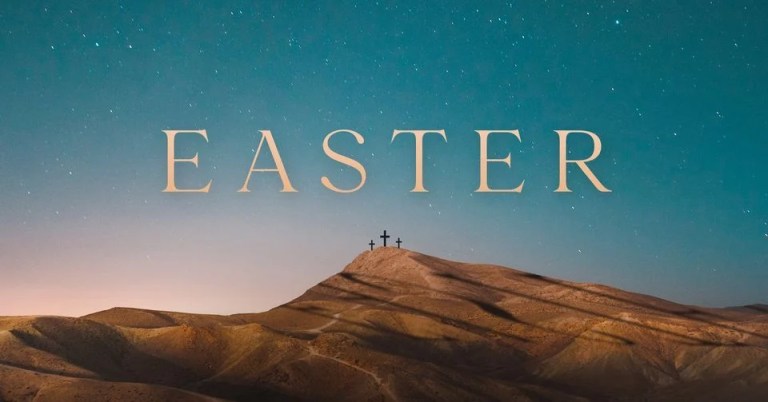News
Everything You Need To Know About Easter Celebration

Easter celebration is a global holiday that marks the Resurrection of Jesus three days after his death following his Crucifixion on the cross. However, many Christians term the Easter celebration as a joyful end to the Lenten season of fasting and penitence.
Easter, also known as Pascha or Resurrection Sunday, is a Christian festival and cultural holiday commemorating the resurrection of Jesus from the dead. Although the remembrance of Jesus’ Resurrection most likely took place earlier, the earliest known Easter celebration dates to the 2nd century.
Easter as a principal festival of the Christian church follows a period of fasting called Lent, in which many churches set aside time for repentance and remembrance. Lent begins on Ash Wednesday and ends on Good Friday, the day of Jesus’ crucifixion.
The 40-day period of fasting was established by Pope Gregory 1 using the 40-day pattern of Israel, Moses, Elijah, and Jesus’ time in the wilderness.
The week leading up to Easter is called The Holy Week and includes Palm Sunday (the day Jesus entered Jerusalem and was celebrated), Maundy Thursday (the “Last Supper” where Jesus met with his disciples to observe Passover), and Good Friday (when Jesus would be crucified on the cross).
Easter
This pivotal event stands as the bedrock of Christian belief, embodying the promise of redemption, eternal life, and the triumph of light over darkness. For believers, Easter represents the culmination of God’s divine plan for humanity, offering profound hope, forgiveness, and the assurance of salvation through Christ’s sacrificial death and glorious resurrection.
According to one theory put out by the Venerable Bede in the 8th century, Easter originated with the Anglo-Saxon goddess of fertility and spring, Eostre, also known as Eostrae.
This perspective assumes that Christians took pagan names and festivities for their holiest feasts, the same as the perspective linking the origins of Christmas on December 25 to pagan celebrations of the winter solstice.
Meanwhile, there is now broad agreement that the name originates from the Christian identification of Easter week as in albis, a Latin phrase that became eostarum in Old High German, the ancestor of the contemporary German and English term, and was recognised as the plural of alba (“dawn”). The French name for Easter, Pâques, comes from the Latin and Greek Pascha (“Passover”).
Brief History Of Easter
Easter actually originated as an ancient pagan celebration of the spring equinox. In Christianity, the day was dedicated to observing the resurrection of Jesus Christ, celebrated around the time of the Jewish Passover.
As the Gospel of Christ spread, early Christians who did not participate in Jewish customs eventually merged their ceremonies with the pagan spring festival, recognizing Easter as “resurrection day.”
Early Christianity saw a significant debate over the appropriate date to commemorate and celebrate Jesus’ resurrection, with opposing Eastern and Western viewpoints. It wasn’t until the eighth century that the Paschal issues were finally settled.
Christians commemorated the Crucifixion Day in Asia Minor on the same day Jews marked the Passover offering or 14 Nisan, the first full moon of spring.
Therefore, regardless of the day of the week, the resurrection was witnessed two days later on Nisan 16. On Sunday, the first day of the week, people in the West commemorate Jesus’ Resurrection from the dead. Easter was therefore always observed on the first Sunday following the 14th of the month of Nisan.
history Easter
The churches began to celebrate on Sundays more and more, and the Quartodecimans, or proponents of the “14th day,” continued to be in the minority. Easter was declared to be celebrated on the first Sunday after the first full moon after the spring equinox, or March 21, by the Council of Nicaea in 325. Therefore, any Sunday between March 22 and April 25 can be Easter.
Due to a slightly different calculation used by Eastern Orthodox churches based on the Julian calendar (which is 13 days ahead of the Gregorian calendar), the Orthodox Easter celebration typically takes place later than that of Protestants and Roman Catholics. Furthermore, it is forbidden by Orthodox tradition to celebrate Easter concurrently with or before Passover.
Key Points To Know About Easter
Easter is a time of great joy and celebration for Christians worldwide, as they commemorate the central event of their faith, the resurrection of Jesus Christ. It is a time for reflection, gratitude, and renewed faith in the promise of salvation and eternal life.
1. Resurrection of Jesus
Easter celebrates the resurrection of Jesus Christ on the third day after his crucifixion, as described in the New Testament. According to Christian belief, Jesus’ resurrection is central to the Christian faith as it signifies victory over sin and death, and it validates Jesus’ identity as the Son of God.
2. Easter Date
Easter falls on the first Sunday after the first full moon following the vernal equinox, which can occur between March 22 and April 25. The date varies each year based on this lunar calendar formula.
3. Holy Week
Easter is preceded by Holy Week, which begins with Palm Sunday commemorating Jesus’ triumphal entry into Jerusalem. The week includes Maundy Thursday, which commemorates the Last Supper, Good Friday, marking Jesus’ crucifixion, and Holy Saturday, a day of solemn reflection before the resurrection of Christ.
Holy Week
4. Easter Sunday
This is the primary day of Easter celebrations. Christians attend church services where they celebrate Jesus’ resurrection with prayers, hymns, and sermons. Many churches hold sunrise services as a symbolic representation of the empty tomb discovered by Mary Magdalene and other women.
Easter Sunday
5. Easter Eggs
The tradition of Easter eggs is believed to have pagan origins, symbolizing fertility and new life. In Christianity, eggs became a symbol of Jesus’ resurrection, as they represent new life emerging from the shell, similar to Jesus emerging from the tomb. Today, Easter eggs are often decorated and exchanged as gifts.
Easter eggs
6. Easter Bunny
The Easter Bunny is another secular tradition, that is believed to have originated from German folklore. It is a symbol of fertility and is often associated with the arrival of Easter, bringing baskets filled with candy, toys, and Easter eggs to children.
Easter burning
7. Lent
Easter is preceded by the season of Lent, a period of fasting, prayer, and penance lasting approximately 40 days (excluding Sundays), representing the 40 days Jesus spent fasting in the desert. Lent ends with Easter Sunday, marking the culmination of the Lenten season.
8. Easter Traditions
Christian denominations and cultures have various traditions associated with this celebration, including Easter parades, egg hunts, special meals, and family gatherings. These traditions vary widely across the world but generally emphasize themes of renewal, rebirth, and hope.
Easter Traditions
Why Do Christians Fast During Easter
Fasting during Easter is a voluntary spiritual practice undertaken by some Christians as a way to deepen their faith, express repentance, and prepare for the celebration of Jesus’ resurrection on Easter Sunday.
Christians need to fast during the season of Lent as a form of spiritual discipline and preparation for the celebration of His resurrection.
Here are several reasons why fasting during Easter is practised by some Christians:
Mourning and Repentance
1. Mourning And Repentance: Fasting can be a way for Christians to express sorrow for their sins and to repent in preparation for the joyous celebration of Easter. By abstaining from certain foods or practices, individuals may seek to purify themselves spiritually and draw closer to God.
Imitating Jesus
2. Imitating Jesus: Fasting during Lent is often seen as a way to imitate Jesus’ 40-day fast in the wilderness before beginning his ministry. Christians may view Lent as a time to follow Jesus’ example of self-denial and spiritual preparation.
Spiritual Discipline
3. Spiritual Discipline: Fasting is considered a spiritual discipline that helps Christians focus their attention on God and cultivate a deeper relationship with Him. By abstaining from physical nourishment, individuals may become more attuned to their spiritual needs and the presence of God in their lives.
Preparation for Easter
4. Preparation for Easter: Easter is the most significant celebration in the Christian calendar, commemorating the resurrection of Jesus Christ. Fasting during Lent serves as a period of preparation and anticipation for the joyous event of Easter Sunday.
5. Symbolism of Renewal: The season of Lent, including fasting, is often associated with themes of renewal, transformation, and rebirth. Christians may view fasting as a symbolic way to shed old habits or attitudes and embrace a renewed sense of faith and commitment.
Focus on Prayer and Almsgiving
6. Focus on Prayer and Almsgiving: Alongside fasting, Christians often engage in increased prayer and acts of charity during Lent. Fasting can create space for deeper prayer and reflection, while also freeing up resources to help those in need through acts of generosity and almsgiving.
prayer
7. Tradition And Church Practice: Fasting during Lent has been a longstanding tradition in many Christian denominations, including Catholicism, Eastern Orthodoxy, Anglicanism, and Protestantism. It is often encouraged or prescribed by church leaders as a means of spiritual preparation for Easter.
10 Things To Do In The Month Of Easter
Certainly! Here are ten things you can consider doing during the Easter celebration. Feel free to adapt them to suit your preferences and circumstances, and may your Easter be filled with joy, hope, and spiritual growth!
1. Attend Easter Services: Participate in church services and liturgies leading up to and including Easter Sunday. These services often include special hymns, prayers, and sermons focusing on the resurrection of Jesus Christ.
2. Reflect on the Meaning of Easter: Take time for personal reflection and meditation on the significance of Easter. Consider how the resurrection of Jesus impacts your faith and life.
3. Read the Easter Story: Read and reflect on the biblical accounts of Jesus’ crucifixion and resurrection found in the Gospels (Matthew, Mark, Luke, and John). Allow these narratives to deepen your understanding of Easter.
4. Fast and Pray: Consider fasting or dedicating extra time to prayer during the Lenten season leading up to Easter. Use this time to draw closer to God and seek spiritual renewal.
5. Participate In Lenten Practices: Engage in traditional Lenten practices such as giving up a particular food or habit, performing acts of charity, or attending Lenten study groups or retreats.
6. Celebrate With Family And Friends: Gather with loved ones to celebrate Easter together. Share a special meal, exchange Easter greetings, and enjoy fellowship with one another.
7. Decorate Eggs: Participate in the tradition of decorating Easter eggs. You can dye eggs, paint them, or use other creative techniques to make beautiful designs. This can be a fun activity for individuals, families, or communities.
8. Attend Easter Events: Look for Easter-themed events in your community, such as Easter egg hunts, parades, or festivals. These events can be enjoyable for people of all ages and provide opportunities for socializing and fun.
9. Serve Others: Use the Easter season as an opportunity to serve others in your community. Volunteer at a local charity, visit the elderly or sick or participate in a service project that benefits those in need.
10. Express Gratitude: Take time to express gratitude for the gift of salvation made possible through Jesus’ resurrection. Thank God for His love, grace, and mercy, and consider ways you can live out your faith in service to others.
Who Is Entitled To Fast During Lenten Period
Fasting during the Easter period, particularly during Lent, is a practice observed primarily by Christians, especially those within denominations that follow liturgical calendars. Here’s who is typically entitled to fast during this time:
1. All Christians: Fasting during Lent, including the Easter period, is open to all Christians who choose to participate. While it’s not obligatory for all, many Christians view fasting as a voluntary spiritual discipline.
2. Members of Liturgical Churches: Christians belonging to liturgical traditions such as Catholicism, Eastern Orthodoxy, Anglicanism, and some Protestant denominations often observe fasting during Lent as a part of their spiritual practice.
3. Individuals Seeking Spiritual Renewal: Fasting during Lent and the Easter period is often undertaken by individuals seeking spiritual growth, repentance, and renewal. It can be a personal decision based on one’s faith journey and relationship with God.
4. Those Preparing for Baptism or Confirmation: In some Christian traditions, individuals preparing for baptism or confirmation may engage in fasting and other Lenten practices as part of their spiritual preparation for these sacraments.
5. Church leaders: including clergy and pastors, may encourage fasting among their congregations and may themselves participate in fasting during the Easter period as a way to lead by example and deepen their own spiritual lives.
6. Healthy Adults: Fasting during Lent and the Easter period typically involves abstaining from certain foods or activities, such as meat, sweets, or entertainment, as a form of self-discipline and spiritual focus. However, individuals with health concerns or dietary restrictions should consult with a healthcare professional before fasting.
7. Those Able to Maintain Spiritual Focus: Ultimately, fasting during the Easter period is open to any individual who is able to maintain a spirit of prayer, self-denial, and repentance during this time. It is a personal decision that should be made prayerfully and with discernment.
It’s important to note that fasting practices and guidelines may vary among different Christian traditions and communities. Some may observe strict fasting rules, while others may adopt more flexible or individualized approaches. Additionally, fasting should always be approached with wisdom, balance, and consideration for one’s physical and mental health.
Benefits Of Fasting Ahead Of Easter Celebration
Fasting during the Easter period, particularly during Lent, can offer several potential benefits for individuals on a spiritual, physical, and emotional level. Here are some of the benefits associated with Easter fasting:
1. Spiritual Growth: Fasting during Lent provides an opportunity for spiritual introspection, growth, and renewal. By abstaining from certain foods or activities, individuals can create space for prayer, meditation, and reflection on their faith journey and relationship with God.
2. Deepened Devotion: Fasting can help individuals develop a deeper sense of devotion and commitment to their spiritual practices. It allows them to focus more intensely on prayer, scripture reading, and other religious activities during the Easter period.
3. Discipline and Self-Control: Fasting requires discipline and self-control, as individuals voluntarily abstain from certain pleasures or comforts. Through the practice of fasting, individuals can cultivate greater self-discipline, which can benefit other areas of their lives as well.
Preparation for Easter
4. Identification with Jesus: Fasting during Lent is often seen as a way to identify with Jesus’ 40-day fast in the wilderness before beginning his ministry. By following Jesus’ example of self-denial and dependence on God, individuals can deepen their connection to the Easter story and the significance of Jesus’ sacrifice.
5. Spiritual Cleansing: Fasting can be a means of spiritual cleansing and purification, allowing individuals to release burdens, confess sins, and seek forgiveness. It provides an opportunity for repentance and reconciliation with God and others.
6. Increased Empathy and Compassion: Fasting can foster empathy and compassion for those who experience hunger or lack. By temporarily depriving themselves of certain comforts, individuals may develop a greater awareness of the needs of others and feel motivated to take action to alleviate suffering.
7. Physical Health Benefits: Depending on the type of fasting practised, there may be potential physical health benefits such as improved digestion, detoxification, and weight management. However, it’s important to approach fasting with caution and to prioritize health and well-being.
8. Renewed Focus on Priorities: Fasting can help individuals reassess their priorities and values, shifting their focus away from material concerns and toward spiritual matters. It provides an opportunity to simplify one’s life and recommit to what is truly important.
9. Sense of Accomplishment: Completing a period of fasting can instil a sense of accomplishment and satisfaction, as individuals overcome challenges and obstacles in pursuit of their spiritual goals.
Overall, Easter fasting can be a meaningful and transformative practice for individuals seeking to deepen their faith, grow spiritually, and align themselves with the themes of repentance, renewal, and redemption associated with the Easter season.
-

 News2 days ago
News2 days agoOsun Communal crisis: Slain NSCDC operative Buried Amid Tears [Photos]
-

 News4 days ago
News4 days agoKings Worshipping Idols Are Herbalists-Oluwo
-

 News3 days ago
News3 days agoFIDA Calls For Prosecution Of Medical Doctor Accused Of Raping Teenage Admission-seeker In Osun
-

 News2 days ago
News2 days agoNSCDC Officer Killed, Palace Burnt, Others Injured As Communal Clash Erupts In Osun Communities















